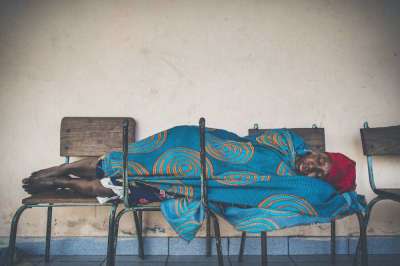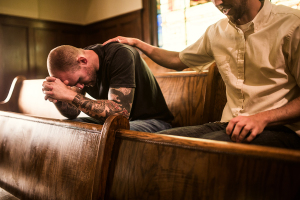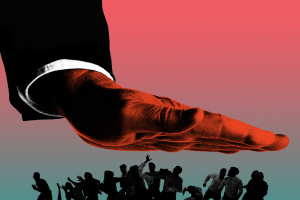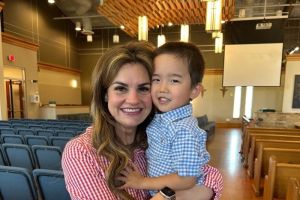When Jesus calls us to stay

It has been a little over six months since Cyclone Idai--one of the strongest on record for Africa and the Southern Hemisphere--left its devastating mark in Beira, Mozambique. This summer, I had the opportunity to travel to Mozambique with Food for the Hungry (FH) as a disaster response assistant to help with some of the rebuilding efforts, including logistics, capturing stories, and communications coordination.
I have seen what poverty looks like before--I had spent two years in Guyana through the Peace Corps--but I was not prepared to experience what I saw and heard in Mozambique.
As I drove through the communities of Dondo district, Beira, I saw homes completely destroyed, schools without roofing, and large resettlement sites filled with tents that people called home. I saw chunks of roads completely caved in and heard tragic stories of women and children being stuck in trees waiting for the flooding from the cyclone to recede. It’s estimated that 90 percent of Beira was underwater after Cyclone Idai hit. The most recent death toll stands at over 1,000 people, with close to 2 million people affected. I couldn’t imagine what it must have felt like to lose almost everything. And yet, I was surprised by the communal spirit of not only their suffering and commitment to help one another restore their lives--but also the conviction I felt for us as global brothers and sisters in Christ to partner in rebuilding, together.
Everyone I came across seemed to have been affected in some way by the cyclone, including the local FH Mozambique staff. They themselves were victims of the cyclone: they had their own homes severely affected by the torrential winds and rain. Immediately following the cyclone, they described to me how hectic those early days were as they tried to care for their own families and serve the communities that were completely washed away by the cyclone. I still cannot fully comprehend how these staff members mustered the mental stamina and managed to provide life-saving support and relief to others while their own homes were partially destroyed. Although much progress has been made to rebuild homes, schools, and roads, there is still much work to be done.
During my deployment, I was able to see how committed the FH staff members were in providing relief to the most vulnerable communities. It is now been over six months since Cyclone Idai made landfall and the local Ministries and international aid organizations are still working tirelessly to provide support and recovery assistance to cyclone-affected households. There was a deep sense of shared responsibility among all NGO partners, humanitarian workers, government officials, and local Mozambicans. I heard many stories of individuals volunteering to distribute shelter kits to their neighbors, community members coming together to restore schools, and so forth.
I had the privilege of visiting a local community where FH was performing a school rehabilitation project. As I was taking pictures of the progress of Consito Primary School, I met four fathers that shared with me their experiences after the cyclone – Armando Mussage, Jacinto Marcelino, Fernando Paulo, and Alfonso Calvo. They said that the roofing of the community primary school was completely gone after the cyclone. The children of Consito could not attend classes since all of the desks and chairs were scattered all over the school grounds, the windows were completely shattered, and parts of the school walls had crumbled to the ground. The fathers expressed how devastating it was for their community. These four men participated in a community mobilization group days after the cyclone hit to restore the bits of roofing that remained and clean up the mess that Cyclone Idai left. I asked them how their children felt after seeing their efforts to restore the school.
What they said shocked me: none of their children attended Consito Primary School. All of their children either attended an alternate primary school, or were too young to go to school. These men had no personal gain in helping to restore this school and despite that fact, they did not hesitate to help their community during a time of crisis.
Disaster relief is not just a job for NGOs but it is a shared responsibility among everyone, especially the Christian community. Just like the FH staff members and Armando, Jacinto, Fernando, and Alfonso, our role as Christians is to lend a helping hand to our neighbor, not just our neighbor next door to us but our neighbors in Christ that may be thousands of miles away.
When I arrived to Mozambique one of the things that struck me the most was how thankful the local FH staff were towards me. They expressed how appreciative they felt for all of the thoughts and prayers sent from the U.S. When I was at Consito Primary School, the four fathers I met expressed how grateful they were for FH’s contributions. My time in Mozambique helped me realize just how important our contributions are even from a distance. I used to think that my prayers or donations didn’t matter or make it all the way there, but hearing people say "thank you" has completely changed my perspective.
How often do we “help” or serve, when there isn’t a direct personal benefit to us? As a global community, it is our responsibility to not only pray for disaster-affected countries, but also take action in helping these communities rebuild themselves.
In Matthew 25, Jesus himself says: “Truly I tell you, whatever you did for one of the least of these brothers and sisters of mine, you did for me.” As Christians, let’s continue to care for our neighbors all around the globe when the rest of the world has turned away--knowing we are ultimately serving God himself.
Damaris Bravo is the Internal Communications Coordinator for Food for the Hungry, a Christian relief and development organization working to graduate communities from human poverty in over 20 countries worldwide. This summer, she served as the Disaster Response Assistant with FH in Mozambique, where the organization has been working to rebuild communities through clean water and sanitation efforts, food distribution.



























